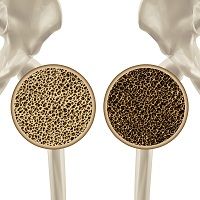Denosumab: Can RANKL Inhibition Improve Insulin Resistance?
With more than 40 million Americans either diagnosed or at high risk for osteoporosis as they age, researchers are scrambling to find ideal preventive and curative agents. One target that strengthens bones is excessive osteoclast activity. A team of researchers recently found that one biologic that targets excessive osteoclast activity may positively influence another problem of later life: insulin sensitivity.

With more than 40 million Americans either diagnosed or at high risk for osteoporosis as they age, researchers are scrambling to find ideal preventive and curative agents. One target that strengthens bones is excessive osteoclast activity. A team of Italian researchers recently found that one biologic that targets excessive osteoclast activity may positively influence another problem of later life: insulin sensitivity. Their small study appears ahead of print in the International Journal of Endocrinology.
The RANKL/RANK/OPG (osteoprotegerin) pathway regulates osteoclast activity and bone resorption. Previous research examining glucose’s role in diabetes-associated bone disease suggests that the glucose-RANKL pathway is reciprocal. Elevated glucose may alter bone turnover by decreasing osteoclast differentiation and function. Elevated circulating RANKL levels appear to elevate risk for type 2 diabetes mellitus.
In the current study, these researchers postulated that systemically blocking RANKL using the monoclonal antibody denosumab might alter glucose metabolism in osteoporotic women. Denosumab is a strong, targeted, and reversible bone resorption inhibitor often used in postmenopausal women to reduce the fracture risk (vertebral, nonvertebral, and hip). Using a prospective study design, they enrolled 14 postmenopausal severely osteoporotic nondiabetic women and administered one dose of denosumab 60 mg subcutaneously. Participants had an oral glucose tolerance test at baseline, 4 weeks (when circulating denosumab peaks) and 12 weeks (when circulating denosumab has generally decreased) after the single injection.
They noted that one dose of denosumab 60 mg inhibited serum alkaline phosphatase efficiently, confirming its effect as an antiresorptive. It failed to create significant changes in fasting glucose, insulin, or HOMA-IR at 4 and 12 weeks. It did, however reduce the hepatic insulin resistance index at 4 weeks and HbA1c levels at 12 weeks.
This is preliminary data that suggest additional research is needed to determine if, and at what doses and administration schedules, RANKL inhibitors might disrupt glucose metabolism in nondiabetic patients.